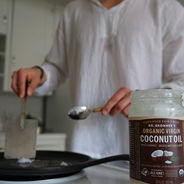Fitness Nutrition Myths: Carbs, Potassium, Protein
- Christian Van Camp

- Sep 18, 2020
- 6 min read
Everyday we are bombarded with false information from ‘trustworthy health professionals’. Especially in the sports nutrition realm, it can be a real challenge to separate fact from fiction. Is eating carbs prior to exercise helpful? Does potassium actually prevent cramps? How much protein can we actually absorb in one meal? Find out what the science says now!

Understanding basic human physiology and how our bodies react to certain diets, movements & supplements helps us establish a strong foundation to wellness. It helps us attain that stress-free and energized lifestyle. Our everyday actions create long-term health consequences— the micro forms the macro.
If you aren’t prioritizing your plate with your exercise routine, you are doing your body, mind and spirit a massive disservice. Without nutrition adequacy tied to your fitness, you might end up going down a rocky road of health complications.
I will be using data from leading exercise physiologist, researcher, and sports nutrition consultant, Dr. Jeukendrup, a hydration expert, sports nutrition & hydration consultant, and author, Dr. Bob Murray, and a leading protein nutrition researcher and university professor, Dr. Stuart Phillips for their input on the three sports nutrition myths. Their input was built on distinctive forms of research and are derived from different arrays of expertise. Without the inclusion of these professionals’ input and PubMed research, the argument against these three sports myths and the physiological effects they have on athletes would be total doo-doo.
This leads to the purpose of this blog, which is to amplify the truth and discount the most common misconceptions of sports nutrition. More people need to highlight the typical mistakes and bad advice made by ignorant ‘experts’ in the nutrition and fitness industry. There is so much repeated and outdated data all over the internet, in blogs, magazines, and journals.
Research from the primary source is key. That’s why we must be weary of false proclaims— do not believe everything you read or hear unless backed by modern science! With that in mind, let’s begin with the first myth:
MYTH #1– Carbohydrates Prior to Exercise Improves Performance

The timing of carbohydrate consumption is strictly based upon individuality. The one-size-fits-all approach should be thrown out when applied to athletes’ performance. It varies person-to-person—there is no strict guideline on when to eat carbohydrates. No two individuals’ body chemistries operate the same. Based on systematic reasoning, different people experience different results, whether hypoglycemia (low blood sugar) is present or not during exercise.
It also depends on what type of exercise is being performed. If you have been doing keto for over 4 weeks and are entirely fat-adapted, then endurance, cardio-oriented sports such as cross-country running may be more suitable for you. That is because you would literally be running on a seemingly endless supply of fatty acids and may not ‘bunk’ from eating carbohydrates (glucose) prior; which eventually runs out during long-distance movements. Several hours of training and competing will require different amounts of carbohydrates (or lack thereof) than high-intensity, short-duration.
If you are doing more high-intensity anaerobic training like weight-lifting, then carbohydrates may be of benefit. This is because it will store ample amounts of glucose energy in the muscles and liver. to allow for a more powerful, shorter-timed lifting session vs. continuous medium-paced.
If you prefer to implement carbohydrates prior to weight-lifting/resistance exercises, eat either complex, fiber-rich carbs like sweet potatoes, quinoa, or steel-cut oats OR opt for the quick sugar like white rice or honey. The majority of studies go both ways: eating complex carbs several hours prior OR consuming simple sugars right before show very few differences in performance.
People say eating 3 hours prior to exercise will improve performance more than consuming within an hour. “Consuming quick-sugar within an hour can cause you to enter a state of hypoglycemia (low blood sugar) and can suppress fat-oxidation.” But there simply is not a one-size-fits-all approach. Science flows both ways.
Basically, going full-circle, you will have to find what is best for your individuality.
I personally prefer carbs before most workouts because I do notice an extra edge. Unless I feel the need to follow cyclic ketosis… depends on the day and the workout!
MYTH #2– Potassium Prevents Muscle Cramps

Bananas are not the only food high in potassium. Gollieheee! That is the one food people associate with potassium for some odd reason, even though there is a plethora of other foods out there that you can consume with even greater potassium levels, such as moringa, dates, apricots, lentils and leafy greens, to name a few.
So, what gives? Why is poor potassium the culprit for causing cramps in athleticism and exercise? Many people think it is lost heavily in the sweat, however it actually is far less than sodium and the sweat barely scratches the surface on full-body potassium stores.
So, sweat can be the culprit not because of potassium but because of further electrolyte loss and dehydration which throws off the nerve receptors in the muscles, therefore leading to cramps.
Potassium isn’t the only thing causing cramps. Cramps are also caused by other electrolytes in the muscles (magnesium, sodium, calcium, chloride, etc), one’s hydration status and their Transient Receptor Potential (TRP) ion channels.
When you eat certain compounds like capsaicin (the heat) in red pepper, electrolytes in mustard or pickle juice, and foods like lime, ginger, and cinnamon, the TRP receptors notify your brain to calm the nerves down in muscles. These compounds in these foods don’t have to be digested and absorbed to alleviate muscle cramps. The compounds activate receptors in the oral cavity (mouth) which activate TRP channels to the brain, and they finally chill your muscles out from cramps. Complex, I know.
Take home message: stay hydrated, consume mineral-rich salt and electrolytes (magnesium definitely numero uno), and add strong spices before, during and after exercise to prevent cramps.
MYTH #3– You Need A LOT of Protein to Recover & You Cannot Absorb 20g+ Protein in 1 Meal

What’s the necessary amount of protein to promote protein synthesis to reach optimal exercise performance and recovery? Well, the internet is rife with eating 2.5g protein/kg body mass— which is quite a bit if you ask me. I am currently 195lbs (divided by 2.2 = 88.6kg). If I had to eat 2.5 x 88.6, that would be a staggering 222g of protein. It's not that hard to consume that amount if I ate 4-8oz of healthy meat at every meal, but I personally would rather not do that.
It's safe to say I hold an objective perspective when explaining the weaknesses of this third myth. The amount of protein necessary for athletes varies tremendously— it all goes back to bio-individuality. What workouts are being performed? How long? Is it anaerobic (i.e. weight-lifting) or aerobic (i.e. jogging)?
Of course athletes and exercise enthusiasts require more protein to promote lean muscle than the recommended daily allowance of 0.8/kg body weight. The real question should be, what sources of protein are you consuming because essential amino acids are critical for repair, not just “protein.” Eating animal protein will no doubt fill the gaps in better than a vegan diet, hands-down. 4oz of grass-fed beef is over 25g protein. 4oz of ANY plant protein will never hit that number.
If you are calorie restricting than you will need A LOT more protein to prevent muscle wasting. But if you are hitting your calories and macros, you most likely will benefit from 1.5g/kg body mass. So, for example, 88.6kg x 1.5 = 133g protein a day. That is fully attainable when working out and hitting weights 3-4x a week (even with HIIT workouts sauced in once a week). I usually aim for 160g a day to play it even more safely.
Okay now that daily protein talk is knocked out, it's now time to discuss how much you can absorb in one meal. To keep things short and sweet: Your body can easily assimilate over 20g of protein in 1 meal.
Protein researcher Stuart Phillips of McMaster University stated this: ‘‘Stimulation of MPS (muscle protein synthesis) is an important aspect of stimulating muscle growth. When we originally observed that 20 g of protein ‘did the job’ to maximally stimulate MPS, we were studying trained young men following a heavy leg workout. MacNaughton used a whole body routine, and they showed that a 16% difference between 20 g and 40 g protein was significant. My take is that as per dose of protein goes from 20 g to 40 g you may squeeze out a little more MPS, but it’s a case of diminishing returns (electronic communication, Stuart Phillips, PhD, January 2, 2017).’’
Consuming 40g of protein in one meal will be absorbed just fine. Just keep in mind, the MPS may diminish slightly, so breaking up into smaller meals throughout the day may be of benefit for your muscle fitness goals.

































Comentarios